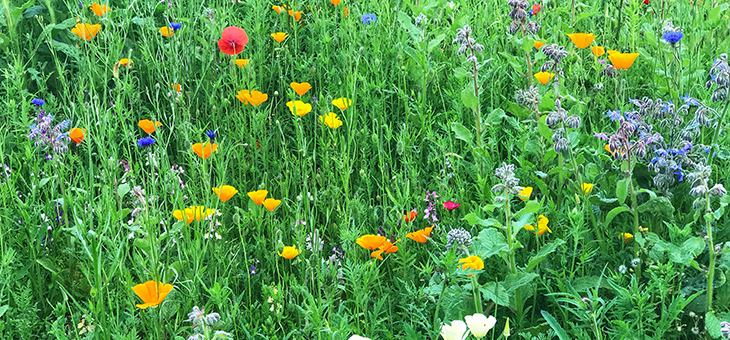Rewilding has become a buzzword in recent years, but exactly what does it mean? In a nutshell, it’s the restoration of ecosystems to encourage biodiversity, allow wildlife to thrive and let nature take care of itself.
It used to be a term applied to large areas of land allowed to return to nature, but now, we’re also being encouraged to do our bit to rewild domestic gardens.
That doesn’t necessarily mean allowing your entire outdoor space to revert to its natural state, but instead to leave some parts of it undisturbed and to manage the rest in a wildlife-friendly way.
As well as being good for biodiversity, rewilding a patch of your garden can also provide a wealth of riches, including valuable fertiliser and delicious tea.
Wildflowers, weeds and plants that may once have been considered a nuisance can be harvested and used to enrich your plot – and your life.
Make comfrey fertiliser
Growing a patch of comfrey as part of your rewilding scheme could save you a lot of money in shop-bought fertiliser and do the same job.
The plant sucks up nutrients from the soil and it’s easy to make a liquid feed by filling a bucket with leaves, adding water and then leaving it to steep for a week or two before pouring the (very smelly) liquid onto crops. What’s left can be added to the compost heap to enrich it and help break it down.
Read: What can go in the compost bin?
Stabilise your soil with colour
You may scatter wildflower seeds over your rewilding plot to add colour to the area and encourage pollinators into your garden. But planting wildflowers can also keep soil healthy and, once established, their roots will help stabilise your soil.
This means that during extreme weather such as persistent torrential rain, the roots will help secure the soil particles and nutrients, which could otherwise wash away. Strong root systems are particularly important on sloping plots, where the ground can easily be washed away without stabilising root systems.
Eat your weeds
Some weeds such as chickweed and chamomile are edible and can be cooked and eaten like spinach. Leaves of dandelions and sow thistle can be added to salads too.
Read: Edible garden weeds with health benefits
Have a cup of nettle tea
Nettles seem to pop up everywhere that’s been left to do its own thing. They’re a good indication that the soil is quite high in nutrients, especially phosphorus, and they’re great for making tea.
The Woodland Trust suggests picking the tips of the leaves for the best flavour. Then you can put them in a saucepan with plenty of water, adding honey for sweetness, and boil them for around 15 minutes, before straining and serving. You could even make iced tea if you pour the mixture into a jug and put it in the fridge, before serving with ice.
Cooking or drying nettles neutralises the toxic components, and they can also be used in a soup, blanched for a salad or even added to a pizza.
Allow the grass to grow
Another top tip to rewild your garden is to mow less. Letting the grass grow, rather than cutting it back to within an inch of its life every week, will quickly transform the area into a wildlife haven without any extra input from you.
Wildflowers will quickly appear in it too. And where there are wildflowers, there’s wildlife – so it’s a win-win situation.
Read: Want a better view of the wildlife in your garden?
Nature will rebalance
Once you start rewilding your garden, nature will rebalance itself and you should start to find fewer pests on your plants because their natural predators will be thriving. So, it’s time to throw out the pesticides.
Once you start to let nature take care of itself, no single species will dominate – so pests such as aphids are likely to become a thing of the past relatively quickly. If some undesirables do appear – blackfly on roses, for example – learn to live with them. A few won’t do any harm to the plant and they provide food for birds, which in turn will also help to control the slug and snail populations.
Are you thinking about rewilding a part of your garden? Have you already started? Why not share what you’ve learned in the comments section below?
– With PA
If you enjoy our content, don’t keep it to yourself. Share our free eNews with your friends and encourage them to sign up.

